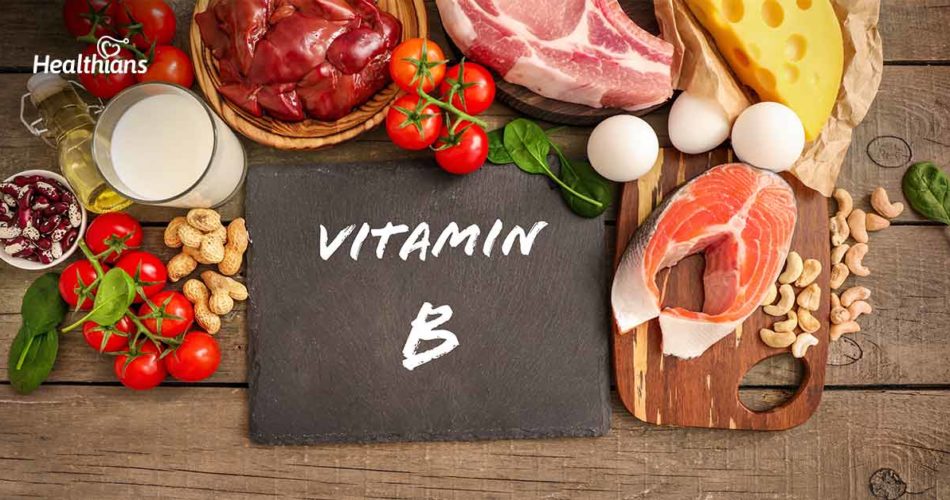Contributed by: Healthians Team
Understanding vitamin B
Your body comprises trillions of cells that are responsible for your overall growth. They provide structure to the body and aid in absorbing nutrients from the food you eat to convert them into energy. They also protect you from various kinds of diseases and promote the health of every organ, muscle, and bone in the body.
Your body consists of two main types of cells, i.e. the red blood cells (RBCs) and the white blood cells (WBCs). The main function of red blood cells is to transport oxygen from your lungs to every tissue, cell, and organ in exchange for carbon dioxide that is exhaled.
The white blood cells are part and parcel of your immune system and help to fight diseases and infections that occur when your body is under attack by harmful bacteria, viruses, and germs.
The most essential vitamin for your body is vitamin B. It helps in identifying that whether your body’s cells are functioning properly or not. Vitamin B aids in creating new blood cells, and helps in maintaining healthy skin, body tissues, and promotes your brain health. There are eight types of vitamin B. i.e.:
- B1
- B2
- B3
- B5
- B6
- B7
- B9
- B12
Let’s go a little further into each of these vitamin types to help you understand them better
- Vitamin B-1: Also known as thiamine, it helps in transforming carbohydrates into energy, aids in muscle contraction, and sending and receiving nerve signals.
- Vitamin B-2: Also known as riboflavin, is responsible for your body’s growth.
- Vitamin B-3: Also known as niacin. It helps in maintaining the health of your skin, nervous system, and digestive system.
- Vitamin B-5: Also known as pantothenic acid, it is responsible for making blood cells and converting food into energy.
- Vitamin B-6: Also known as pyridoxine, it helps in maintaining the health of your nerves, skin, and red blood cells.
- Vitamin B-7: Also known as biotin, it is responsible for maintaining the health of your hair and nails, promotes healthy pregnancy, helps convert food into energy, and also aids in managing your blood sugar levels.
- Vitamin B-9: Also known as folic acid, it helps in making healthy red blood cells and treats or prevent folate deficiency. If you are pregnant or might become pregnant, consuming folic acid can help prevent serious birth defects like spina bifida (underdeveloped spinal cords of the unborn).
- Vitamin B-12: Also known as cobalamin, it is responsible for keeping your body’s blood and nerve cells healthy, making DNA, and protects you from megaloblastic anemia – a blood illness that causes acute fatigue.
How to know if you have vitamin B deficiency?
Vitamin B deficiency is a very serious complication that you should not ignore. You must undergo an early diagnosis if you experience the following symptoms:
- Numbness and tingling in your hands and feet
- Skin rashes
- Stomach ailments like pain, constipation, or diarrhea
- Small cracks around your mouth due to trapped saliva
- The skin of your lips may turn scaly
- A feeling that you may vomit anytime
- Swollen tongue
- Getting irritated over small things or feeling depressed
- Extreme tiredness
- A continuous feeling of weakness
- Problem in concentrating
- Oral ulcers
If the amount of vitamin B increases in your body, you may experience indigestion, mild diarrhea, or even nausea.
The symptoms of vitamin B deficiency and excess are common to that of various other illnesses. Keep in mind that you should not start any medication or vitamin B supplements without the doctor’s approval if you are experiencing any of the above-mentioned symptoms, and should undergo a diagnosis to identify the exact cause.
Diagnosis of vitamin B deficiency
An early diagnosis enables you to take necessary preventive measures and improve your health. A blood test that looks for markers indicating a lack of vitamin B in your body can help detect vitamin B deficiency.
Foods to enhance vitamin B levels
If the diagnosis confirms that you lack vitamin B, increasing or starting the intake of the following foods may help you in improving the level of vitamin B.
- Leafy greens like spinach, broccoli, and lettuce
- Whole-grain foods like brown rice, barley (jau), millet (bajra), oats, and popcorn
- Dairy products like milk, yogurt, and cheese
- Eggs, meat, poultry, and fish
- Citrus fruits like oranges and lemons
- Seed plants like peas and beans
Closing thoughts
Vitamin B is very important for your overall well-being as it influences the health of trillions of cells living in your body. An improper diet or an unhealthy lifestyle can lead to a lack of this important vitamin cause health complications such as low energy levels, dementia, neurological damage, cardiovascular disease, and anemia.
However, you can manage and improve your health efficiently by getting an early diagnosis that will help in ascertaining the exact cause of the symptoms and implementing good lifestyle changes.
Did this article deliver what you were looking for? Tell us in the comments below or reach out to us if you have any questions regarding health complications.




